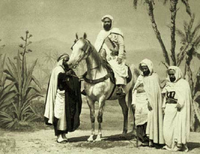
Abd al-Qadir ibn Muhyi al-Din, known as the Emir Abdelkader or Abd al-Qadir al-Hassani al-Jaza'iri, was an Algerian religious and military leader who led a struggle against the French colonial invasion of Algiers in the early 19th century. As an Islamic scholar and Sufi who unexpectedly found himself leading a military campaign, he built up a collection of Algerian tribesmen that for many years successfully held out against one of the most advanced armies in Europe. His consistent regard for what would now be called human rights, especially as regards his Christian opponents, drew widespread admiration, and a crucial intervention to save the Christian community of Damascus from a massacre in 1860 brought honours and awards from around the world. Within Algeria, he was able to unite many Arab and Berber tribes to resist the spread of French colonization. His efforts to unite the country against French invaders led some French authors to describe him as a "modern Jugurtha", and his ability to combine religious and political authority has led to his being acclaimed as the "Saint among the Princes, the Prince among the Saints".
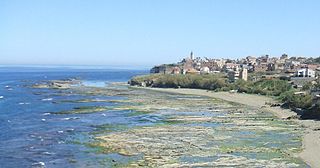
Dellys is a small Mediterranean town in northern Algeria's coastal Boumerdès Province, almost due north of Tizi-Ouzou and just east of the Sebaou River. It is the district seat of the daïra of Dellys. The town is 45 km from Tizi Ouzou, 50 km from Boumerdes, and about 100 km from the capital Algiers.

The Battle of Isly was fought on August 14, 1844 between France and Morocco, near the Isly River. French forces under Marshal Thomas Robert Bugeaud routed a much larger, but poorly organized, Moroccan force, mainly fighters from the tribes of Beni Snassen, but also from the Beni Angad and Beni Oukil; under Muhammad, son of the Sultan of Morocco, Abd al-Rahman. Bugeaud, attempting to complete the French conquest of Algeria, instigated the battle without a declaration of war in order to force negotiations concerning Moroccan support for the Algerian resistance leader Abd el-Kader to conclude on terms favorable to the French who demanded the Sultan of Morocco to withdraw support for Abd el-Kader.

Chlef is the capital of Chlef Province, Algeria. Located in the north of Algeria, 200 kilometres (120 mi) west of the capital, Algiers, it was founded in 1843, as Orléansville, on the ruins of Roman Castellum Tingitanum. In 1962, it was renamed al-Asnam, but after the devastating earthquake on October 10, 1980, it has borne its present name, Chlef, which is derived from the name of the Chelif River, the longest river in Algeria.
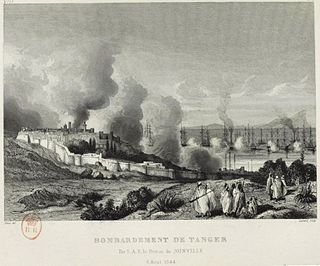
The Franco-Moroccan War was fought between the Kingdom of France and the Sultanate of Morocco from 6 August to 10 September 1844. The principal cause of war was the retreat of Algerian resistance leader Abd al-Kader into Morocco following French victories over many of his tribal supporters during the French conquest of Algeria and the refusal of the Sultan of Morocco Moulay Abd al-Rahman to abandon the cause of Abd al-Kader against colonial occupation.
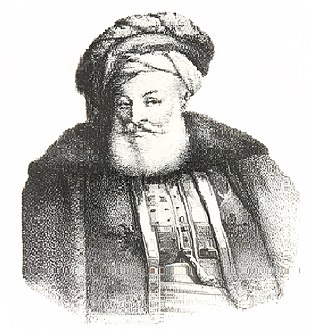
Ahmed Bey ben Mohamed Sherif, also known as Ahmed Bey or Hadj Ahmed Bey was the last Bey of Constantine, in the Regency of Algiers, ruling from 1826 to 1848. He was the successor of Mohamed Menamenni Bey ben Khan. As head of state, he led the local population in a fierce resistance to the French occupation forces. With the position vacant, in 1833 he adopted the title of the leader of Algeria, and the Dey in exile، although this was not recognized by any other country. In 1837 Constantine was taken by the French after an intense siege. He retreated into the Aurès Mountains from where he continued to wage a sort of low-intensity conflict using the tribes still loyal to him until he capitulated in 1848.
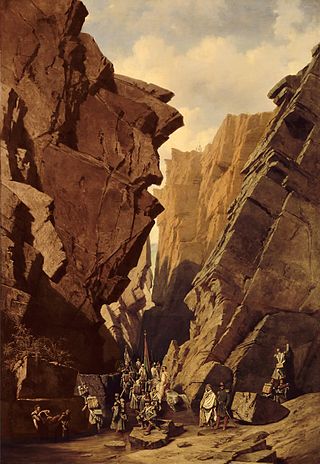
The Iron Gates are a mountain pass in the Bibans in Algeria. They gave their name to the Biban Range.

The French conquest of Algeria took place between 1830 and 1903. In 1827, an argument between Hussein Dey, the ruler of the Regency of Algiers, and the French consul escalated into a blockade, following which the July Monarchy of France invaded and quickly seized Algiers in 1830, and seized other coastal communities. Amid internal political strife in France, decisions were repeatedly taken to retain control of the territory, and additional military forces were brought in over the following years to quell resistance in the interior of the country.

The pacification of Algeria was a series of military operations after the French conquest of the Regency of Algiers that aimed to put an end to various tribal rebellions, razzias and massacres of French settlers that were sporadically held in the Algerian countryside. The conflict was an early example of unconventional warfare.

Louis Alexis Desmichels, born in Digne March 15, 1779, died in Paris in 1845, was a French soldier, an ordinary soldier of the French Revolution became general under the July Monarchy, known for his role in the conquest of Algeria and relations with Abd el-Kader.
The following is a timeline of the history of the city of Oran, Algeria.

The Emirate of Mascara, Emirate of Abd al-Qadir, was a sovereign country founded by Abd al-Qadir al-Jazairi with the allegiance of the people of Algeria to resist the French conquest of Algeria with its first capital at Mascara then Tagdemt after it was taken by France.

Auguste Hubert Warnier was a French medical doctor, journalist and politician who spent most of his career in Algeria. At first he was a Saint-Simonian and was sympathetic to the local population. He thought the Berbers had Germanic blood and a civilization derived from Roman and Christian origins, so could readily adapt to French civilization. He had no respect for the Arab "intruders". Later he took the view that the indigenous people had destroyed the once-fertile environment of Algeria, became a proponent of French colonization and opposed the "Arab Kingdom" policy of Napoleon III. In his last years he was a Representative in the National Assembly for the Province of Algiers. He was responsible for a law that allowed expropriation of land or forced sale to colonists.

The Algerian popular resistance against French invasion refers to resistance in Algeria against the French conquest, which began with the invasion of Algiers in 1830 and lasted until 1903.

The Expedition of the Col des Beni Aïcha in May 1837, during the French conquest of Algeria, pitted the troupes coloniales under Colonel Maximilien Joseph Schauenburg against the troops of Beni Aïcha of the Igawawen.

The First Battle of Boudouaou in 25–26 May 1837, during the French conquest of Algeria, pitted the troupes coloniales under Colonel Maximilien Joseph Schauenburg against the troops of Kabylia of the Igawawen.
Mustapha ibn Muhieddine, known as Emir Mustapha, Sidi Moustafa, Moustafa El Hassani El Djazairi, was an Algerian religious and military leader who led a struggle against the French colonial invasion in the mid-19th century with his brother, Emir Abdelkader.

The Beylik of the West was one of three Beyliks (governorates) of the Regency of Algiers, with the other two being the Beylik of Titteri and the Beylik of Constantine. It was established in 1563, and it was ended during the French conquest.
The battle of Oued Aslaf occurred in the year 1847 following the Treaty of Tangiers. It was a battle between the Alaouite Dynasty of Morocco which was then ruled by Moulay Abd al-Rahman against the Emirate of Abdelkader.

The Battle of Agueddin took place between the Emirate of Abdelkader and the Alaouite Dynasty of Morocco that took place in December 1847.

















